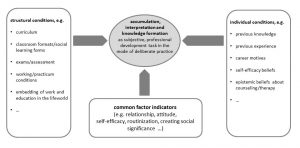How to educate social workers, teachers and medical doctors in study programs and scientific further education is a continuing question. Stichweh has some time ago shown that in modern, reflexive societies even the classic professions (medicine, theology, laws, teachers) are losing more and more of their ability to reproduce themselves along the associated theory frames (e.g. managing exclusive specific knowledge, the sole power to intervene in privacy etc.), not to speak from the so called half- or semi professions like social work. This loss of structural power of professions leads to more or less subtle changes. Regarding learning and education, real mastery instead of certificates and other signs of professional power are more than before coming in focus. Think of medical doctors that are heavily questioned from patients that already come to see them with a internet driven self-diagnosis, or a social worker being confronted with multiple instances all claiming to be responsible and competent for the case.
What works in a given domain and what enables professionals to deliver professional services in that domain is becoming more than ever a question of building personal knowledge, coming along with all the side effects about implicit knowledge building processes, assessing problems of real mastery and the limits of simple training programs versus the difference between learning and education in study programs.

Given the fact that single methods and techniques that are trained in a standardized manner to all future professionals is not the way to go to build real mastery, the subject oriented side of professionalization shows up. Using what common factors are empirically showing (e.g. Hattie for the field of learning, or Wampold and Imel for the field of psychotherapy) as the horizon for successful education, different learners have very different professional development tasks in becoming effective. Creating constructive education processes then means to identify the professional development tasks for every learner and to design a productive way to become better in the tension between individual and structural conditions and requirements. Who should learn what and when in which mode? Using tools like the BeraLab, a simulation environment for psychosocial counseling where students can lead sessions with trained actor clients, those huge differences in individual requirements and prior knowledge can be used to shape each learners’ goals in his and her zone of proximal development.

Whilst this model of subject oriented professionalization was developed in the field of counseling research, we are now looking forward to cross domains and see what happens – on the GEPF congress using it for teacher, and on the German congress for psychosomatic medicine for psychotherapeutic research.
1 Gedanke zu „Professionalization instead of Profession: Common factors as a perspective for subject oriented education“
Die Kommentare sind geschlossen.